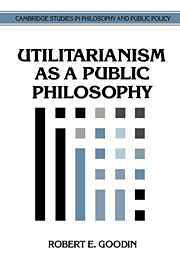1 - Utilitarianism as a public philosophy
Published online by Cambridge University Press: 28 January 2010
Summary
Lecturing on an eminent Victorian at the height of the Vietnam War, Stuart Hampshire passes this telling judgment on the state of contemporary utilitarianism:
British utilitarianism was a school of moral thought … which set out to do good in the world, even though it was only a philosophy; and it … succeeded in large part over many years in this aim. [It] became part of the ordinary furniture of the minds of … enlightened persons, who would criticize institutions, not from the standpoint of one of the Christian churches, but from a secular point of view. … The utilitarian philosophy, before the First World War and for many years after it, … was still a bold, innovative, even a subversive doctrine, with a record of successful social criticism behind it. I believe that it is losing this role, and that it is now an obstruction.
Sharing both Hampshire's admiration for utilitarianism's earlier accomplishments and his dismay at many of its current tendencies, I aim in this book to rehabilitate a certain form of utilitarianism and to restore it to the critical social role it once so proudly boasted.
Utilitarianism is a doctrine that in its standard nineteenth-century formulation, directs us to produce “the greatest happiness.” In its most useful modern reformulation, it is “the moral theory that judges the goodness of outcomes – and therefore the Tightness of actions insofar as they affect outcomes – by the degree to which they secure the greatest benefit to all concerned.”
- Type
- Chapter
- Information
- Utilitarianism as a Public Philosophy , pp. 3 - 27Publisher: Cambridge University PressPrint publication year: 1995
- 2
- Cited by



